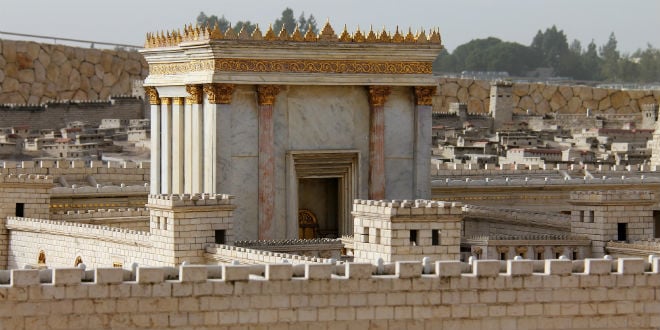By working on our unity, we will do our part in helping to bring about the final national redemption.
This week’s Torah portion is “Bo” (Exodus 10:1-13:16), and in it we read about the famous and beloved offering of offerings, the Korban Pesach, the Passover Lamb. This offering had many rules on how it was to be prepared and eaten. As the Torah says: “They will eat the meat on that night … Do not eat it raw, or cooked in water, it must be roasted over fire.” (Ex. 12:8,9).
So among the many questions asked regarding this offering are: Why must it be eaten at night, and why must it be roasted?
To answer the questions, some introduction is in order.
All of the animal sacrifices offered in the Holy Temple fall into one of two categories: personal offerings and communal offerings. A personal offering is brought by an individual for any number of reasons, such as to atone for a sin or to express thanksgiving. The communal offerings, on the other hand, are on behalf of the entire nation, and commemorate national events and holidays.
The Passover offering is unique, however, as it combines characteristics of both a personal and a national offering: It commemorates a national historic event, yet the obligation to bring the offering is upon each and every individual. To paraphrase the famous Passover question: Why is this offering different from all other communal offerings?
The answer contains an important lesson about the Jewish people. The Passover offering teaches us that every Jew is connected to the nation. Jews are so connected to one another that an individual’s offering can sometimes have the status of a communal offering. This special connection among Jews is reflected in the manner that the Passover offering is to be eaten.
It is explained that our daytime activities are characterized by extensive social interaction, while at night we retire to our homes and private lives. By commanding that the Passover offering be eaten at night, the Torah is emphasizing that our connection with the nation is not based on some type of social contract or common interests. Rather, we are connected by means of the Torah, which binds all Jews together as one, at all times. This national connection continues and applies even when an individual retires to the privacy of his or her home.
This can also be seen in the manner in which the offering is cooked. If it were to be boiled in water, the taste of the meat would spread to the water and other foods in the pot. Roasting, however, does not allow for the meat’s taste to transfer to any other food. This keep the taste, and the holiness, inside the Passover offering. Once again, we see a connection between the communal and the individual. The national Jewish connection is different than our connection with other nations.
The Passover offering represents both the individual and the nation. Passover marks our first major national redemption, and we now await the final national redemption with the coming of the Messiah. By working on our unity, we will do our part to bringing him faster!
By Rabbi Ari Enkin, Rabbinic Director, United with Israel. (Based on the teachings of my friend Rav Chanan Morrison taken from the teachings of Rav Kook. See: http://ravkooktorah.org/BO63.htm for more teachings of Rav Kook.
For more insights by Rabbi Ari Enkin on this week’s Torah reading, click on the links below:
https://unitedwithisrael.org/living-torah-the-jews-who-left-egypt-had-no-time-to-bake-bread-so-what/
https://unitedwithisrael.org/reminding-ourselves-of-our-mission/
